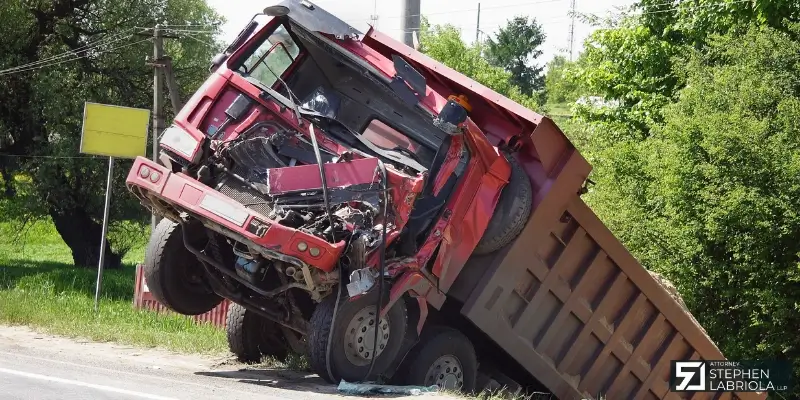|
|
Last Modified on Jun 02, 2025
Essential safety tips to prevent garbage truck driver injuries are more important than ever in an industry where workers face daily risks from traffic, equipment, and environmental hazards. Garbage truck drivers face hazardous early-morning routes and the operation of heavy hydraulic systems, which can result in serious or life-threatening injuries.
Consistent use of protective gear and adherence to proper protocols while maintaining alertness can greatly lower the risk of job-related accidents.

Use Spotters and Maintain Clear Communication
The most frequent cause of garbage truck accidents is inadequate visibility when reversing or performing tight turns. Blind spots and unexpected obstacles frequently appear on residential streets as well as alleyways and busy parking lots.
A trained spotter assists drivers in avoiding collisions with pedestrians and other obstacles, such as vehicles and fences. When feasible, spotters should maintain eye contact with the driver while guiding movements through standardized hand signals or radio communication.
Backup cameras and sensors on modern garbage trucks cannot replace the need for clear communication between operators and spotters. Using a two-person system for difficult tasks significantly lowers the risk of preventable serious injuries during work operations.

Follow Proper Lifting Techniques and Use Assistive Equipment
Sanitation workers report back and shoulder injuries as some of their most common non-fatal work-related injuries. In 2023, the fatal work injury rate for refuse and recyclable material collectors was 41.4 per 100,000 full-time equivalent workers, making it one of the deadliest occupations in the U.S.
Incorrect lifting techniques, together with ongoing physical stress, often lead to these injuries. Employees must maintain correct body positioning by bending at the knees and keeping loads close to their bodies while lifting without twisting.
Workers should utilize mechanical lifts and other assistive equipment whenever they are accessible to prevent relying solely on manual strength. Employers need to conduct continuous safety training to reinforce proper handling techniques while supplying ergonomic equipment that minimizes collection strain.
Wear High-Visibility and Protective Gear
Garbage truck drivers typically work in areas with limited natural light and high traffic. Drivers operating garbage trucks must wear reflective vests or jackets to ensure visibility to both coworkers and other motorists. Sanitation workers require protective gloves, safety glasses, and steel-toed boots in addition to visibility gear to shield themselves from hazards like glass shards or chemical spills.
A routine stop can quickly become a medical emergency if workers fail to wear just one necessary piece of protective gear. Businesses must implement PPE standards alongside regular inspections to identify damaged or worn equipment. Protective equipment takes precedence because it protects workers from sustained injuries and deadly incidents in unpredictable work settings.
Remain Alert to Traffic and Environmental Hazards
Garbage trucks typically travel through residential areas as well as construction sites and locations where visibility and pedestrian traffic are restricted. External conditions like wet roads and uneven pavement, combined with bad weather conditions, make stopping or detecting obstacles more difficult in a timely manner.
Sanitation workers face significant road hazards from drivers who are distracted or traveling at excessive speeds. The use of traffic cones combined with flashing lights and hazard signage serves to notify oncoming drivers about garbage collection operations. To maintain safe vehicle control, drivers need to keep a constant speed, which gives them time to react.
The combination of remaining vigilant, practicing defensive driving techniques, and predicting road hazards helps prevent serious injuries and ensures the safety of collection routes.
Your Atlanta tractor-trailer accident lawyer can be your most important asset when it comes to maximizing the compensation you obtain for your damages. It’s vital to connect with legal counsel you trust after any truck accident in Georgia, so reach out to Stephen LaBriola at your first opportunity to learn how he can help with your case.

FAQs
What Are the Most Common Injuries Garbage Truck Drivers Face?
Back injuries and limb crushing, along with lacerations and slip-and-fall accidents, regularly occur among garbage truck drivers. The common causes of these injuries include heavy lifting tasks, mechanical equipment operation, and traffic collisions. Employing proper technique, together with suitable gear and maintaining alertness, helps minimize many of these risks while working.
How Can Spotters Help Prevent Garbage Truck Injuries?
Spotters help prevent injuries by assisting with reversing operations and tight-space navigation. Spotters serve as an additional visual check to keep drivers safe from hitting pedestrians and vehicles, as well as stationary hazards. The driver and spotter must communicate clearly to avoid major accidents when working in dense or poorly visible environments.
Are Mechanical Lifts Always Safer Than Manual Lifting?
Mechanical lifts decrease physical strain while protecting workers against musculoskeletal injuries. Workers need to utilize assistive equipment for handling heavy or awkward waste whenever possible, rather than lifting it by hand. Improper lifting techniques or excessive lifting frequency during routine tasks can lead to permanent damage, chronic pain, and long-term physical limitations that affect job performance and quality of life.
Can I File a Legal Claim After a Garbage Truck Injury Caused by Negligence?
If your injury resulted from unsafe equipment or another driver’s negligence and hazardous property conditions, you may have valid reasons to file a personal injury claim against a third party.
Workers’ compensation covers basic medical expenses but falls short of addressing pain and suffering or long-term financial loss. An injury attorney can assess whether a claim outside workers’ compensation laws can be filed for your specific situation.
Contact Stephen LaBriola
The prevention of garbage truck driver injuries requires raising awareness about safety while providing proper training and maintaining regular safety practices. Sanitation workers can minimize job-related risks through the use of high-visibility apparel and spotters, along with mechanical lifts.
Safety must always be at the forefront when collecting garbage because of early work hours, the use of heavy machinery, and the presence of traffic. Even experienced drivers face the risk of serious injuries if appropriate safety protocols are absent.
Employers have a responsibility to supply safe equipment and strengthen safety standards while fostering a culture of caution. The breakdown of safety procedures, which leads to serious injury, can result in long-lasting consequences or life-threatening situations.
Stephen LaBriola represents individuals who suffer catastrophic injuries while working in high-risk environments, including sanitation. With a selective caseload and decades of litigation experience, he gives each case his full attention. If you’ve been seriously injured on the job, contact Stephen to discuss your legal options and long-term recovery







